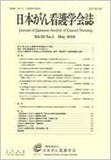Japanese
English
- 販売していません
- Abstract 文献概要
- 参考文献 Reference
要旨
本研究の目的は,前立腺全摘除術後のがん患者の尿失禁の自覚的重症度,情緒的支援の認知とQOLの関係を明らかにすることである.術後尿失禁のある患者77名に,対象者の属性,尿失禁の自覚的重症度(ICIQ-SF),他者からの情緒的支援の認知(情緒的支援ネットワーク認知尺度),QOL(尿失禁特異性QOL尺度日本語版キング健康調査)について自記式質問紙調査を行った.記述統計,各変数の相関を求め,QOLを従属変数とする階層的重回帰分析を行った.結果,対象者の尿失禁の自覚的重症度は中等度,「全般的健康感」と有意な差は認めず,排尿による「生活への影響」,日常の活動7項目すべてと有意な差を認めた.階層的重回帰分析では日常の活動「身体的活動の制限」「心の問題」で有意な変化があり,「身体的活動の制限」は尿失禁の自覚的重症度,情緒的支援の認知「その他」(β=.618,p<0.01,β=−.230,p<0.01)と,「心の問題」は尿失禁の自覚的重症度,情緒的支援の認知「職場」(β=.419,p<0.01,β=−.236,p<0.10)と主効果の直接効果を認めたが,どちらも交互作用項に有意な差は認めなかった.術後のがん患者は排尿による「生活への影響」を感じ生活している.その中で,日常の活動「身体的活動の制限」はその他の人の情緒的支援の認知を,「心の問題」は職場の中の情緒的支援の認知を感じることで尿失禁の生活の影響を和らげることに繋がることが考えられた.看護師は局限性前立腺全摘除術(RP)後の尿失禁の自覚的重症度を的確に捉え,情緒的支援の認知を評価し,日常生活の影響を身体的,心理的(精神的)に細やかに支援することが必要である.
This study investigated the relationship between the self-perceived severity of urinary incontinence, quality of life (QOL), and perception of emotional support in cancer patients after radical prostatectomy (RP). An anonymous self-reporting questionnaire was conducted with 77 patients with postoperative urinary incontinence.
The questionnaire covered demographics, self-perceived severity of urinary incontinence (International Consultation on Incontinence Questionnaire - Short Form), perception of emotional support from others (Emotional Support Network Scale), and QOL (King's Health Questionnaire). Descriptive statistics and correlation coefficients were calculated, and hierarchical multiple regression analysis was performed using QOL as a dependent variable.
Patients perceived their urinary incontinence as moderately severe, with no significant difference from their perceived general health. Perception of incontinence was significantly related to its impact on daily life and to seven factors describing its impact on daily living. The self-perceived severity of urinary incontinence and perception of emotional support (other people) had the direct main effect of limiting physical activity (β=.618, p<0.01 and β=−.230, p<0.01, respectively), while the self-perceived severity of urinary incontinence and perception of emotional support (workplace) had the direct main effect on emotional problems (β=.419, p<0.01 and β=−.236, p<0.10, respectively). There were no significant differences among the interaction terms.
After RP, patients consider the impact of incontinence on daily life. The influence of urinary incontinence on daily living may be ameliorated by reducing limitations on physical activity through perceived emotional support outside the workplace, and by reducing emotional problems through perceived emotional support in the workplace. Nurses should adequately assess the self-perceived severity of urinary incontinence and the perception of emotional support by patients after RP, in order to provide targeted support for its physical and psychological (mental) impact on daily living.
Copyright © 2016, Japanese Society of Cancer Nursing All rights reserved.


